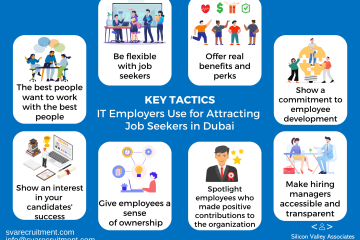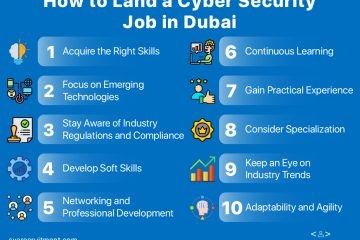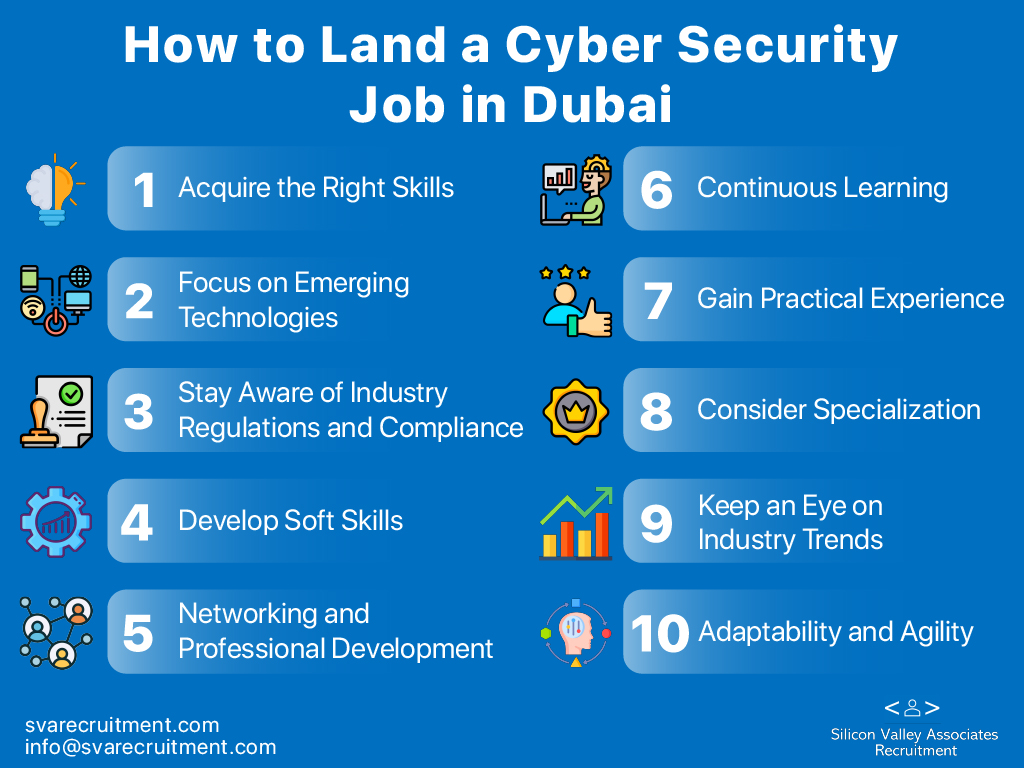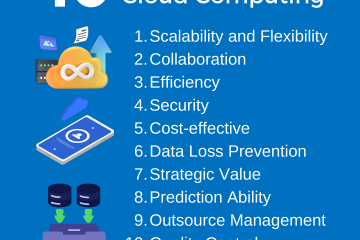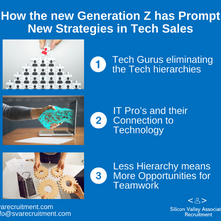In a highly competitive marketplace like Dubai, employers need to stand out from the crowd. Silicon Valley Associates Recruitment, an IT and Recruitment Specialist in Dubai, believe that these proven tactics will help IT Companies win the talent war and increase the chances of attracting job seekers.
To maximize an organization’s potential, hiring the right talent is crucial. Thus, tech employers are using a multitude of techniques that help them attract and retain job seekers in a competitive job market. Even in a country like Dubai where job opportunities abound, Tech Recruiters revealed that there are still several hurdles companies must overcome to cast their nets far and wide in an effort to attract the best talent available. Although it’s always ideal to hire the right person for the right job, several strategies are often employed to make candidates feel like you’re the place they’ll be happiest – whether it’s being seen as providing benefits over other options or being selected for exclusive events.
See also: Top 10 Tips For Successful Social Recruiting in 2023
By implementing these key strategies, IT recruiters in Dubai can successfully attract job seekers and build a talented workforce that drives innovation and success in the dynamic landscape of the city’s IT industry.
- The best people want to work with the best people.
This is why it’s important for employers to be able to attract the most talented job seekers. The best way to do this is by creating an environment where employees feel valued, appreciated, and encouraged to grow their skills and knowledge. When tech employers take these steps, they’re able to attract top talent who are looking for a place where they can grow their careers.
The best people want to work with the best people – That’s why IT recruiters at SVA Recruitment advice that you need to build a culture of excellence at your company by encouraging your employees to have fun and be creative. If you have a great team, then it’s easier for you to attract talented people who will want to join your company
- Be flexible with job seekers.
If you’re looking to hire someone, you want to make sure they’re the right fit for your company. That’s why it’s important to keep in mind that not every person who applies for a job will be a good fit for your company—and that’s okay! Don’t let yourself get caught up in the idea that if someone applies, they must be perfect for the position. There are plenty of other people out there who would be great for the job and have just as much potential.
If you find yourself feeling frustrated by a lack of applicants or a lack of quality applicants, take some time to reflect on what might be standing in your way of finding great employees. Are there any obstacles that could affect employee morale? If so, consider ways to address those issues so that when candidates do come knocking at your door, they’ll know what an awesome place this is to work!
Read also: 4 Best Practices to become a Highly Effective Data Science Leader
- Offer real benefits and perks.
To attract the best talent, you need to offer real benefits and perks. That’s not just true for your company—it’s true for any company, in any industry. But in the world of tech and innovation, employees want more than just a paycheck.
The digital age has brought us more flexibility and freedom than ever before. IT pros believe that employees are looking for more out of their jobs than just a way to pay rent and buy groceries. They want meaningful work, opportunities to grow their skills, and the chance to make an impact on the world around them.
- Show a commitment to employee development.
In order to maintain a competitive edge, Tech Recruiters suggest that organizations must focus on employee development. This means providing opportunities for employees to learn new skills and take on new challenges. It’s not just about keeping employees engaged and happy; it’s also about ensuring that the company is able to adapt to change quickly, which is critical when the market conditions are constantly shifting.
- Show an interest in your candidates’ success.
Success is a very personal thing. When you’re interviewing candidates, it’s important to show an interest in their success by asking questions that allow them to talk about their skills and achievements.
The best way to do this is by asking open-ended questions that allow the candidate to tell you how they’ve overcome challenges and achieved success. For example, if the candidate says they have good communication skills, try asking them about a time when they had trouble communicating with someone else and how they dealt with it. This will give you an idea of how well they work under pressure and whether or not they can identify problems before they get too big.
Read also: Turning these 8 IT leader challenges into opportunities in 2023
- Give employees a sense of ownership.
When employees feel like they have a stake in the company, they are more likely to work harder and be more engaged. This can be achieved by giving them ownership of projects or by creating a collaborative team environment, where everyone feels like they have a say in decisions that affect their work.
- Spotlight employees who made positive contributions to the organization.
One of the most effective ways to give credit where it’s due is by highlighting outstanding employees through various channels. Whether it’s an internal newsletter, company-wide announcements, or an online platform, sharing success stories can have a powerful impact on the entire organization.
By showcasing these employees and their accomplishments, we foster a culture of appreciation, motivation, and healthy competition.
- Make hiring managers accessible and transparent.
Making hiring managers accessible and transparent is essential for fostering a positive and inclusive hiring process. When hiring managers are approachable and open, it creates a welcoming environment for candidates and encourages them to ask questions, seek clarification, and provide feedback. Transparent communication from hiring managers regarding job requirements, expectations, and the overall hiring process helps candidates make informed decisions and feel valued throughout the process.
Attracting job seekers in Dubai’s competitive IT industry requires a strategic approach and a deep understanding of the candidates’ expectations. Employers are leveraging key tactics to stand out and attract the best talent.
By offering attractive compensation packages that align with the high cost of living in Dubai, employers demonstrate their commitment to valuing their employees’ skills and contributions. Embracing flexible work arrangements, including remote and hybrid options, allows employers to tap into a global talent pool and provide a better work-life balance for their employees.
Silicon Valley Associates is a specialist IT Recruitment Agency ideally positioned to support the continual demand from tech companies and IT Departments looking to hire in Hong Kong, Singapore, Shanghai, Dubai, Japan, and Worldwide. Please let us know if you would further advise on the above topic or your hiring needs
———–
See Also: Our Latest Jobs
See Also: Our Latest Candidates
See Also: Our Latest Blogs
